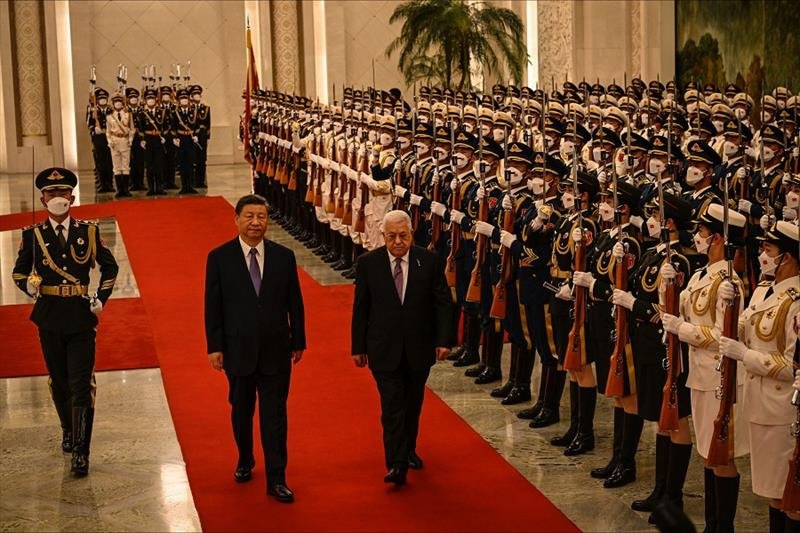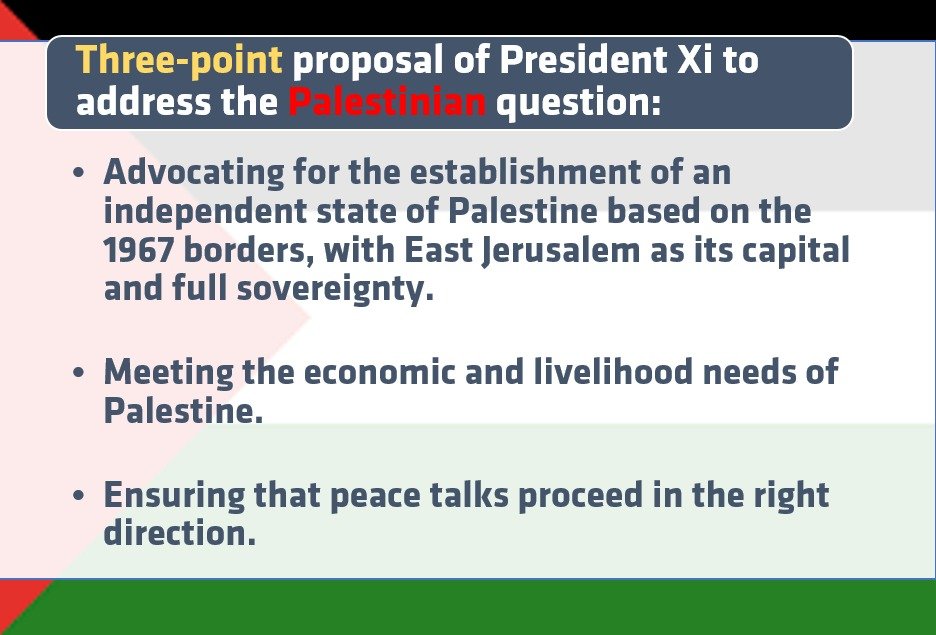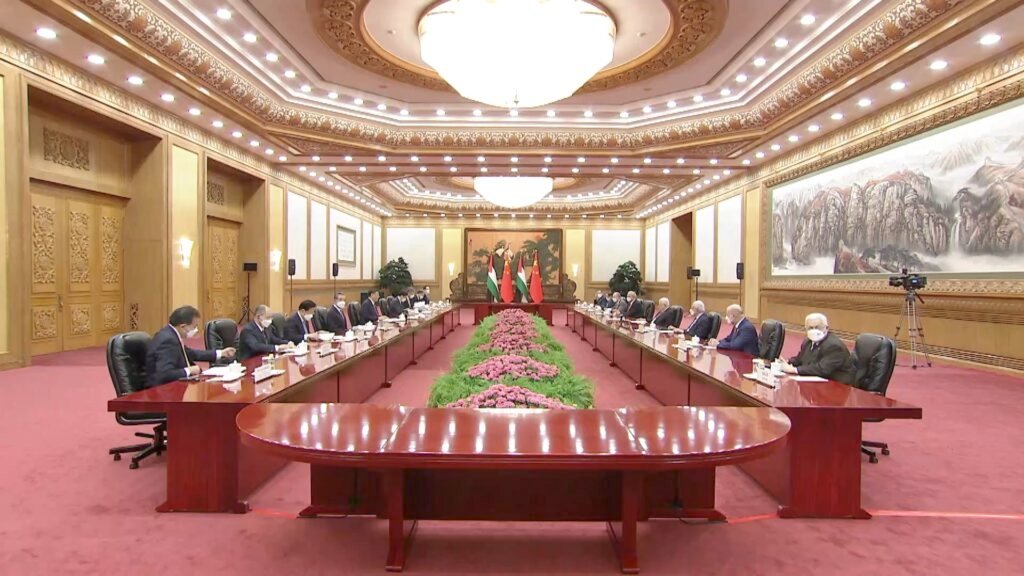In a significant development, China and Palestine have reached an agreement to establish a strategic partnership. The announcement was made during a meeting between Chinese President Xi Jinping and Palestinian President Mahmoud Abbas at the Great Hall of the People in Beijing.
President Xi Jinping expressed his satisfaction with the establishment of this strategic partnership, considering it a noteworthy milestone in the bilateral relationship between China and Palestine. He emphasised that it builds upon the previous achievements and paves the way for a promising future.
You can also read: Sweden and Bangladesh to forge partnership in the IT industry
This visit marks the fifth official trip of President Mahmoud Abbas to China. President Xi warmly welcomed President Abbas, highlighting the significance of his visit as the first Arab head of state to be hosted by China this year.
A testament to unyielding friendship
This year marks a significant milestone as China and Palestine commemorate the 35th anniversary of the establishment of diplomatic relations. President Xi Jinping acknowledged China’s early recognition of the Palestine Liberation Organisation and the State of Palestine, emphasising the long-standing friendship between the two nations.
Both countries have affirmed their status as good friends and partners, with a commitment to enhancing bilateral friendship and cooperation across various sectors. Over the past years, China and Palestine have experienced positive growth in their relations. In 2019, they initiated negotiations for a free trade zone, and in December of the same year, they signed a Memorandum of Understanding on Belt and Road Initiative (BRI) cooperation. The Chinese Foreign Ministry reported that bilateral trade reached $158 million in the previous year, reflecting a 23.2 percent increase compared to the previous year.
During the meeting, President Xi Jinping assured President Abbas that China remains willing to provide assistance within its capabilities to alleviate humanitarian difficulties and support reconstruction efforts in Palestine. In 2016, China pledged to offer 50 million yuan (approximately $7.4 million) in grants to Palestine to improve the well-being of the Palestinian people.
Consequently, China has contributed to the construction of more than 40 projects in Palestine, including the Palestinian Foreign Ministry building.

Chinese President Xi Jinping extended a warm gesture of diplomatic ties by hosting a welcoming ceremony for Palestinian President Mahmoud Abbas at the prestigious Great Hall of the People in Beijing on June 14, 2023.
A three-point proposal to address the Palestinian question
During the meeting between President Xi Jinping and President Mahmoud Abbas, President Xi reaffirmed China’s unwavering support for the just cause of the Palestinian people in restoring their legitimate national rights.
President Xi presented a three-point proposal to address the Palestinian question. The proposal includes advocating for the establishment of an independent state of Palestine based on the 1967 borders, with East Jerusalem as its capital and full sovereignty. It also emphasises meeting Palestine’s economic and livelihood needs and ensuring that peace talks proceed in the right direction.

Recognising the evolving global landscape and developments in the Middle East, President Xi expressed China’s readiness to strengthen coordination and cooperation with Palestine. He pledged to work towards a comprehensive, just, and durable solution to the Palestinian question at the earliest opportunity.
President Abbas expressed his appreciation for China’s various initiatives aimed at achieving an early and equitable resolution to the Palestinian question.

He expressed confidence in China’s wisdom and impartial stance, while also looking forward to China playing a greater role in promoting intra-Palestinian reconciliation and fostering peace in the Middle East.
President Xi has consistently emphasised the impact of the Palestinian question on peace and stability in the Middle East. He has advocated for the rights of the Palestinian people on numerous international occasions, urging a fair settlement of the issue.
To prevent the marginalisation of the Palestinian question, China has taken proactive measures. As the rotating presidency of the UN Security Council in 2021, China organised five meetings on the Palestinian question and issued a presidential statement. Furthermore, China proposed three routes to implement the “two-state solution” and organised a seminar for peace activists from Palestine and Israel. Chinese special envoys have made visits to Palestine, Israel, Egypt, Jordan, and other countries in the region to mediate the Palestinian-Israeli conflict.
Strategic calculations of this talk
The recent announcement signifies China’s ongoing efforts to enhance its political and economic influence in the Middle East, as it competes with the United States in the region. China’s primary objectives encompass a range of strategic goals, such as ensuring the acquisition of energy resources, facilitating access to markets for its military and civilian exports, and advancing its particular form of governance characterised by authoritarianism. This aligns with Russia’s joint challenge to the Western-led democratic world order.
China has established diplomatic ties with the Palestinian Authority for an extended period and has appointed a special envoy to engage with Israeli and Palestinian officials. However, China’s involvement in the region has been primarily focused on construction, manufacturing, and other economic ventures.
During Palestinian President Mahmoud Abbas’s visit to China, he received a warm reception with full military honors at the Great Hall of the People in Beijing. Chinese President Xi Jinping, who leads the ruling Communist Party, emphasised the strong friendship and partnership between the two nations. Xi expressed unwavering support for the Palestinian people’s just cause to regain their legitimate national rights. He further stated China’s willingness to facilitate a comprehensive, fair, and lasting solution to the Palestinian issue.

President Abbas has expressed his administration’s strong interest in enhancing cooperation with China as part of its initiative and securing investments. He particularly praised China’s dedication to financing diverse development projects proposed by Palestine and urged the swift dispatch of technical delegations to carry out these initiatives.
China leverages such partnerships to enhance its diplomatic standing and provide advantageous opportunities for Chinese corporations during negotiations for infrastructure projects aligned with the government’s “Belt and Road Initiative.” However, concerns have been raised regarding the debt burden imposed on many countries involved in these projects, as they struggle to repay loans from Chinese banks.
China has also pursued closer ties with Israel to expand its diplomatic presence and gain access to advanced technology.
China’s growing influence in Middle East
Abbas’s visit to China follows the country’s successful hosting of talks between Iran and Saudi Arabia, restoring diplomatic relations between the two rival nations. This development has further elevated China’s influence in the region, particularly as Gulf Arab states perceive the United States as gradually withdrawing from the broader Middle East.
China has recently positioned itself as a peacemaker in the Middle East, taking steps to broker diplomatic relations between Iran and Saudi Arabia and now seeking to facilitate peace talks between Israelis and Palestinians. From a reasonable time, the Chinese Foreign Minister, Qin Gang, has engaged in conversations with key officials from both Israel and Palestine, emphasising the importance of calmness, restraint, and dialogue in resolving the Israeli-Palestinian conflict.
China’s involvement in the region stems from its strategic interests in acquiring resources and expanding its markets. By actively engaging in mediating disputes, China aims to promote stability, which is essential for safeguarding its long-term economic and political interests in the Middle East. China has been a significant trading partner for Middle Eastern countries, particularly in oil purchases, and has invested over $273 billion in the region between 2005 and 2022.
While China’s aspirations to become a prominent player in the Middle East are evident, some experts argue that its actual influence in the region might be overstated.
The groundbreaking Iran-Saudi Arabia deal, for example, was primarily the result of a two-year engagement between the two countries, with assistance from other nations such as Oman, Iraq, and the United States.
China’s involvement was seen as opportune rather than central to the negotiations. In the case of the Israeli-Palestinian conflict, there is skepticism regarding China’s role as a balanced mediator, as both sides have shown little interest in initiating peace talks. Israel, in particular, perceives China as a biased player and maintains a strong alliance with the United States.
Israel’s concerns are also fueled by China’s support for Iran, which Israel views as a security threat. The Chinese proposal to facilitate peace talks between Israel and Palestine has been met with skepticism, with Israeli Prime Minister Benjamin Netanyahu emphasizing the indispensable alliance between Israel and the United States. Some observers draw parallels between China’s involvement in the Israeli-Palestinian conflict and its stance on the Ukraine war, suggesting that China’s neutrality is questionable due to its alignment with certain parties.
However, other experts argue that China’s increased involvement in mediating the Israeli-Palestinian conflict has been welcomed by Palestine and other Arab states. These actors believe that China can contribute constructively to resolving the longstanding tension in the Middle East. China’s decision to openly express its intention to broker peace talks may have been influenced by the urging of Palestinian and Arab leaders.


